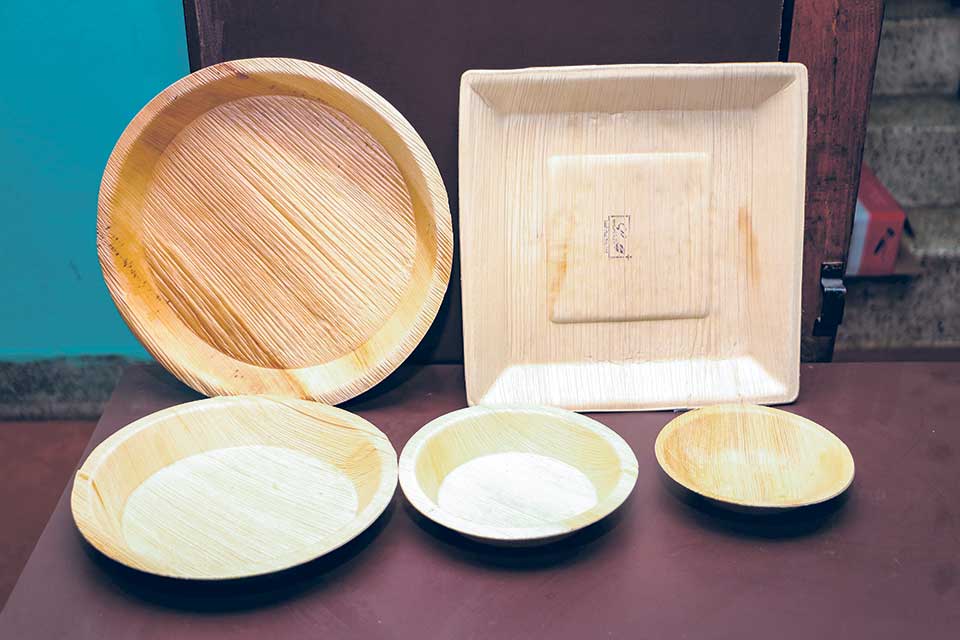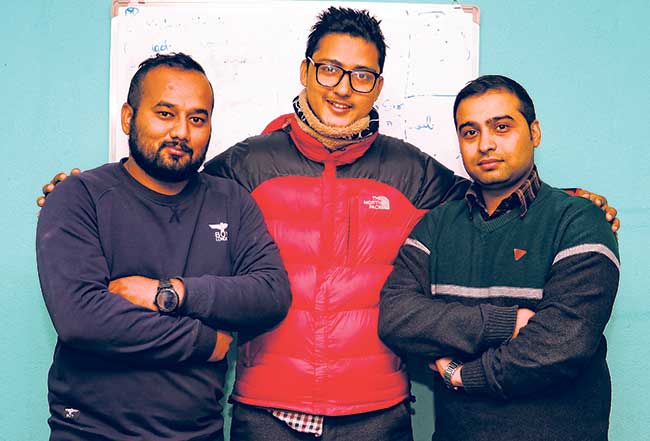Celebrating local craft in Jewelries
5 years ago

5 years ago

6 years ago

6 years ago

6 years ago

6 years ago

KATHMANDU, Dec 21: As the country lurches towards economic development, more youths are emerging as entrepreneurs, but at the same time, many are searching for ideas that could contribute to the society and environmental cause while also making a profit.
 Everyone knows about climate change and the environmental degradation caused by the use as well as haphazard dumping of plastic. Habitual routines are not easily changed, but it does not mean it is impossible. As a replacement to non-biodegradable plastic plates and bowls, Leaf Plus Pvt Ltd has started an idea to use leaf sheaths of Areca catechu (betel nuts) to make plates and bowls that are much healthier to eat in, and are also environment-friendly.
Everyone knows about climate change and the environmental degradation caused by the use as well as haphazard dumping of plastic. Habitual routines are not easily changed, but it does not mean it is impossible. As a replacement to non-biodegradable plastic plates and bowls, Leaf Plus Pvt Ltd has started an idea to use leaf sheaths of Areca catechu (betel nuts) to make plates and bowls that are much healthier to eat in, and are also environment-friendly.
Compared to the cheap paper and plastic cups as well as plates, these products might be a bit expensive. One of the Leaf Plus co-founders Swaviman Acharya said, “Given the man-hour invested, the products eventually come at a higher price. Paper and plastic plates are that good with hot food, while these plates and bowls work well to serve the dishes that are hot/cold or solid, liquid and gravy. Our products are also microwave-friendly, so one can directly heat food on them.”
Leaf sheaths used by Leaf Plus come from the eastern districts of Nepal; Jhapa, Morang and Sunsari, where the about 3.6 million betel nut trees are cultivated in a commercial manner stretching to bigahas of lands. A single tree sheds about seven to eight leaf sheaths annually. Before Leaf Plus, these sheaths were either being discarded or collected and burnt. Now, these leaves get collected in four different bamboo shelters set up by Leaf Plus near the cultivation areas in the districts.
“On average, these leaves are 0.5-1 meter long. Once collected, they are soaked in water for about 15 minutes and brushed before being kept to dry for two hours and sent to a heat press machine. Treated with a temperature of +250 °C and immense pressure, the leaves take shapes of plates and bowls. We currently have five different shapes; a 10 inch rectangle and 10 inch circular, an eight inch circular, a six inch bowl and four inch bowl,” said another Leaf Plus co-founder, Kobit Singh Baniya.
Their business idea has added value to the lives of the locals as well. For every leaf collected, they pay the local farmers Rs 1-1.5, which has become their additional income source. The heat-press machine in Jhapa is being handled by two local women while youths of the local communities help them in collecting the leaves. By next year, they are planning to set up another community-based plant so that more local youths can get employment.
Baniya first met Acharya in one of the alumni meets at Golden Gate International College. Among many ideas, they decided to invest their time and money on this idea that they thought had the cause and prospects for a business. Another co-founder Bidhan Pokhrel also showed his interest in the idea and works on international clients for the business. While another co-founder Hari Dahal came in contact with Acharya during the latter’s Civic Engagement Project that he conducted in Jhapa as a member of the US Embassy Youth Council Nepal (2014). Dahal expressed his readiness to help their budding idea when Acharya went back to him last year. Now, Dahal handles the local market and coordinates the business in Jhapa.
But for the business to take shape, it took them more than two years of research. After the discussion in the alumni meets, they started researching extensively. They went to Tamil Nadu, India, to research further into businesses that ran in similar module. Their next stop was in Jhapa for research. And some eight months ago, they set up their research and production unit in Hetauda. Since the last two months, they started commercial production too.
Their target audience includes high class restaurants, party venues, airlines, caterers, and to serve in occasions like picnics where paper and plastic plates are used in a large number. They realize it will take them more effort to change the consciousness about the use of alternative resources rather than having to compete for the market. But taking into account the belief Nepalis have about betel nut and its leaves being sacred, they believe the product would be used in social and religious events as well.
However, before commercially starting the mass supply, they are still working to set their base, and are producing as many products as possible in the meantime for a smooth supply in the future. They are open to small-scale supplies and are soon planning to collect more quality leaves and grade them for better products.
Leave A Comment